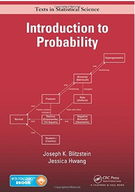(a) Is it possible to have events A, B, C such that P(A
Chapter 2, Problem 49(choose chapter or problem)
(a) Is it possible to have events A, B, C such that P(A|C) < P(B|C) and P(A|Cc) < P(B|Cc), yet P(A) > P(B)? That is, A is less likely than B given that C is true, and also less likely than B given that C is false, yet A is more likely than B if were given no information about C. Show this is impossible (with a short proof) or find a counterexample (with a story interpreting A, B, C). (b) If the scenario in (a) is possible, is it a special case of Simpsons paradox, equivalent to Simpsons paradox, or neither? If it is impossible, explain intuitively why it is impossible even though Simpsons paradox is possible.
Unfortunately, we don't have that question answered yet. But you can get it answered in just 5 hours by Logging in or Becoming a subscriber.
Becoming a subscriber
Or look for another answer
